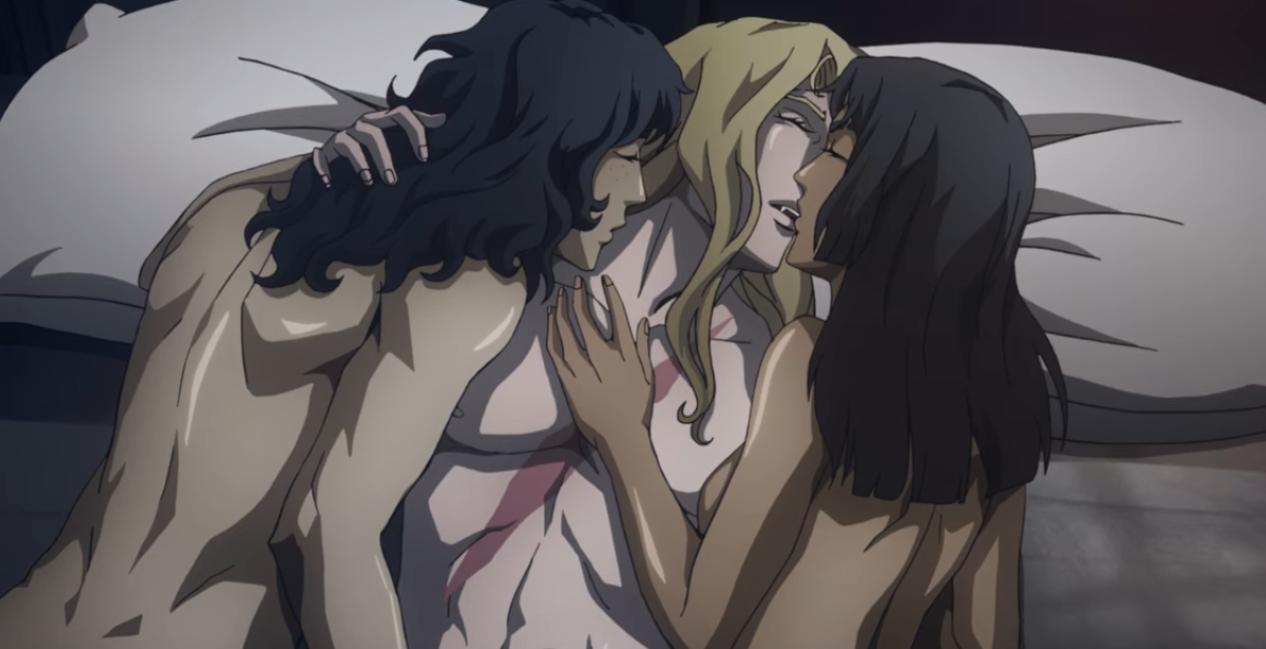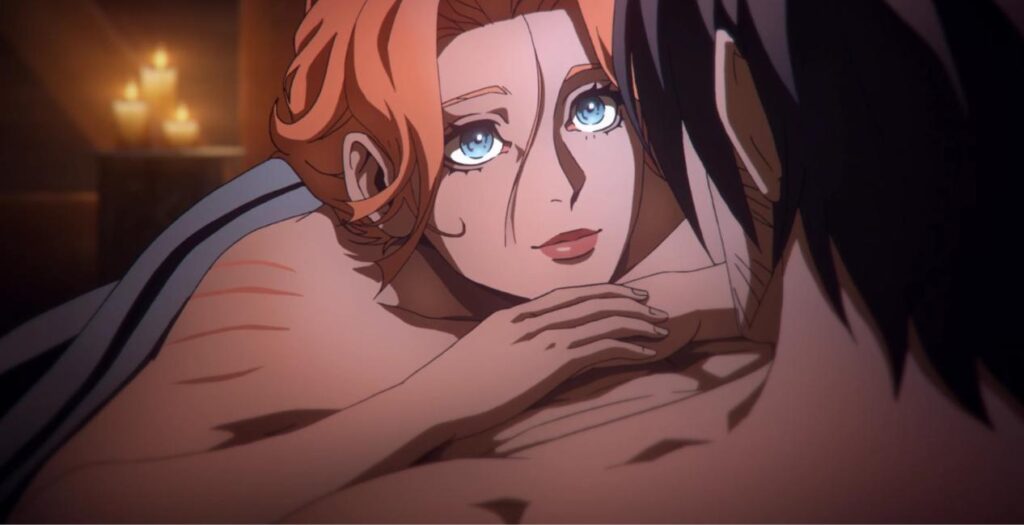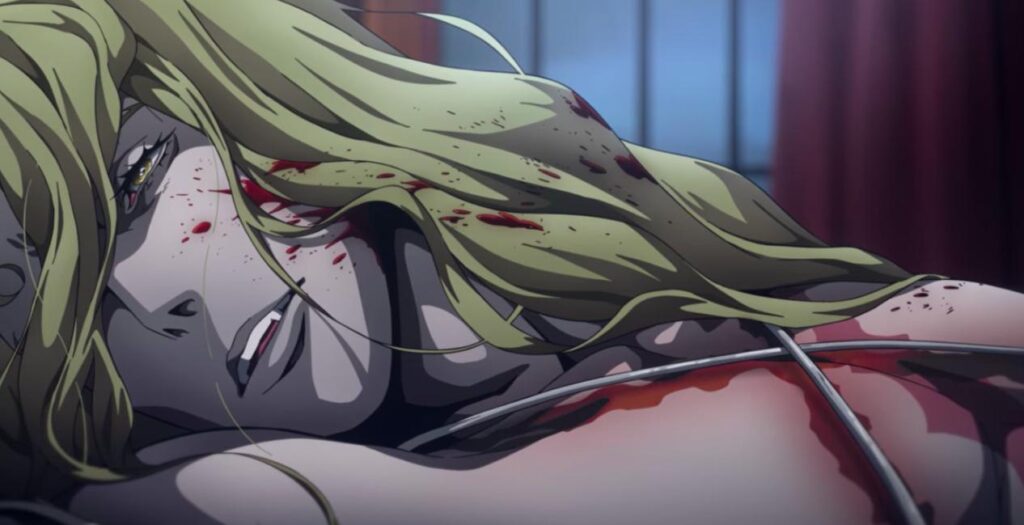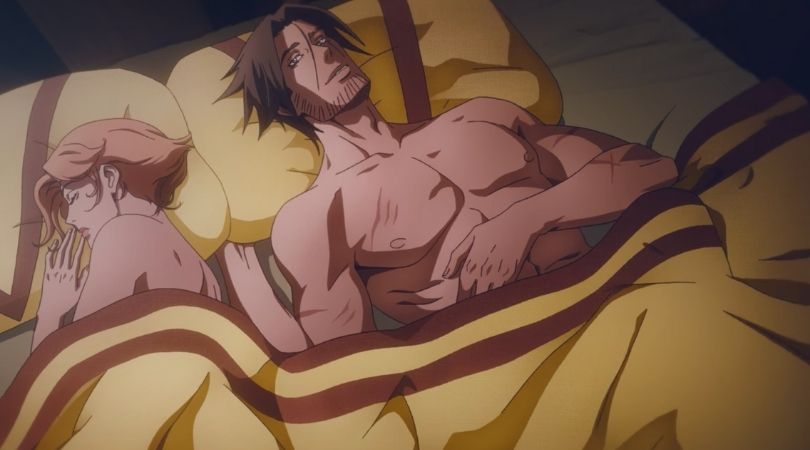Content Warning: Spoilers for Castlevania Season 3 and discussion of manipulation below
We have to talk about sex. It’s an element of storytelling that is often thrown into series to provide either shock value or fanservice and is often dismissed for one of those two. But sometimes, sex on screen works to facilitate more than the ability to showcase naked bodies.
When done well, it can propel the story and work to showcase character arcs and identity. When sex is treated as an important narrative opportunity, it can change horny for the sake of horny into powerfully emotive moments. That’s what happens with Netflix Original’s Castlevania sex scenes.
While some take issue with the use of sex in any medium as inherently pushing for fanservice, what happens in Castlevania is an examination of intimacy. Animated by Austin-based Powerhouse Animation, Castlevania sex scenes are in fact narrative elements that come into play for character arcs. Sex and intimacy answer questions for characters, why are they looking for those moments of connection? How does that moment shape them moving forward?
Unlike other animations and anime more specifically, which use sex mostly for visuals and fanservice, Castlevania sex scenes push past this well, offering intense moments of character growth as well as setbacks. Now, there are some fan-servicing elements, like the throuple.
Castlevania sex scenes buck the tropes of its genre.

It’s undoubtedly a horny show. But sex affects the plot. In fact, in a recent interview with our site, Sam and Adam Deats explained that the series aesthetic came from Ayami Kojima’s work on the game franchise, which, while beautiful, lives in the bi-shonen beauty and not overt sexuality in the way we see it today. While we love Castlevania for its beautiful characters and thirst after them on Twitter, there is much more to them than just appearances.
Additionally, the important thing to note in all of this is that Castlevania does not utilize rape as a plot point. Both Hector and Alucard enter their physical moment with consent and the act stops when the truth of it is revealed. This is different than when rape is used as a tool – alá Game of Thrones.
More specifically, sex in Dark Fantasy is usually one note, and is more often than not used by men of the series to control women. Instead, Castlevania flips the script, both when it comes to gender and how sex is used. The series explores intimacy in a way that looks to highlight character arcs, taking into account why Alucard and Hector became vulnerable and not just the sex act itself.
In Castlevania, sex specifically comes into play in season 3 of the series. The majority of the sexual moments in the season happen in episode 9, which not only cuts between different characters in the act but also to giant physical battles. As we jump into discussing the use of sex in the series, it’s important to note that in Castlevania, sex is intimacy. And beyond that, it’s how intimacy can be healing or manipulating.
Sypha and Trevor represent intimacy in a way that is earned and explored.

On the healing side of things, you have the relationship between Trevor and Sypha. The long-shipped duo is finally confirmed as lovers both in sexual jokes the two make to each other of course a post-sex scene. Unlike the other Castlevania sex scenes, this one between Trevor and Sypha isn’t about the act itself but the connection the intimacy represents. It’s the solidification of what they mean to each other. It serves as a physical representation of the bond they’ve built since the last season.
While in bed, the two discuss St. Germain, the confident man who dropped his facade in front of the pair. They discuss his loneliness and his sadness, and they do so in each other’s arms. They aren’t alone anymore. The scene echoes the two’s conversation in season two, where Sypha and Trevor discuss sadness—the kind that Trevor has and the kind that Alucard has.
The difference between being sad but having enough strength to fight and cover it (Trevor) and the kind of sadness that becomes a void (Alucard) is apparent in the intimacy both men seek and reflective of why Sypha is able to become attached to Trevor in a more concrete way. Sex for them is healing, as much as Trevor accepting Sypha’s proposition to stay by her side at the end of season 2 was.
However, where the series shows tenderness, it also shows manipulation. In episode 9, the sex scenes between Alucard and Hector respective sex scenes are cut together with violent battles. The episode itself balances beauty and intimacy with violence and gore. As the two sides of the episode are blended, it becomes clear that the deep intimacy that both Alucard and Hector are longing for is their weakness.
Unlike Trevor and Sypha, who have left behind at least some of the sadness and loneliness in their lives, Alucard and Trevor have been cast into the lowest parts of their stories. The way that Castlevania uses sex in these last two examples is with a mean undercurrent, but also the only way for these characters to lose everything—in a sense, the ultimate betrayal.
Alucard’s loneliness is captured in Castlevania sex scenes and shapes his narrative.

When it comes to discussing both Alucard and Hector, both of their moments of intimacy reflect a power struggle and a betrayal. Both are fighting when they feel that they don’t have to anymore. Both are being put through pain the same way their story counterparts, Sypha and Trevor, and Isaac, are. In many ways, Hector and Alucard’s battles are harder; they’re both more physically and emotionally vulnerable, and their path to freedom from the pain is marred by needing to realize they truly are alone.
Alucard is falling apart. For a moment, he had friends, and now, with them gone and the manor his tomb, even the comedic building of dolls in Trevor and Sypha’s likeness is immensely depressing. At his loneliest, twins Taka and Sumi walk into his life. They gain his trust.
And he begins to feel happiness. The inclusion of a threesome in this episode can be easily seen as fanservice, and to be honest, on my first watch, I thought it was. But on my second watch and those after, it was clear that Taka and Sumi were stand-ins for the only people that Alucard found solace or friendship in, Trevor and Sypha.
Narratively, Taka and Sumi have finally pierced through Alucard’s walls of loneliness but in the very moment where he will feel happiness in both an emotional and physical sense, they turn on him. Pleasure turns to pain and Alucard has to make the very swift decision to cut them down, to kill those who he thought would save him. Instead, he set their heads on pikes, a warning to anyone who will enter. Alucard is done with the human world, he’s done with vulnerability, and he’s finally become truly alone.
Lenore’s power and Hector’s oppression captured in one Castlevania sex scene.

Then there is Hector; his abuse and imprisonment allow for the emotional manipulation that Lenore puts him through. It ultimately opens the door for her to use intimacy as a literal way to control him. Similar to Alucard, Hector has been lulled into a sense of empathy and connection.
Unlike Alucard, Lenore consumes Hector’s entire sense of self, and he can’t fight back. From the beginning, Lenore is a small woman. She’s quiet, she’s proper, and she’s unassuming. Where Carmilla is violent in her disregard for Hector’s well-being, Lenore offers him solace. She offers him clothing and food. She even spares him when he attacks her.
Lenore, over time, becomes Hector’s safety. While he may not feel love, he feels comfortable, and he owes her his life. The devastating element is that as Hector becomes more and more responsive to Lenore, the audience knows her plan: use sweetness to control him instead of vinegar. Beating him into submission to create demons for her and her sisters won’t work. That’s a given. But lulling him into an embrace, making him feel like he has agency again, and then physically making him enter a bond where he can’t refuse her requests with a magical ring is a sure thing.

Lenore breaks him. Not through pushing his body but by pushing his heart. It’s Hector’s trust in everyone and his view of vampires as something close to a human instead of monsters that allows this to happen. It’s what Carmilla exploited in Season 2, and it’s what Lenore relies on. Intimacy is a weapon. It’s sharp, it cuts, and it leaves Hector even more stranded than before.
While it’s easy to dismiss the sex scenes in episode 9 as horny for the sake of horny, that would be reductive. Not only does each sex scene have its place, deeply rooted in the story, but each scene doesn’t revel in the traditional “tits & ass” that is the focus of other dark fantasies—again, Game of Thrones. Instead, each sexual encounter is animated with emotion. From the score to the positions, what is shown, and what is hidden, each moment is both beautifully explicit and wonderfully balanced. What could have been beyond gratuitous is, instead, extremely emotional.
Castlevania Season 4 is on the way, and as the final season, character arcs are about to be closed. As we celebrate what we’ve gotten over the course of the series’ tenure, we have to acknowledge the role sex and intimacy have played in the series. How it has been used to tell a story of sadness and pain, and how it’s been used to tell a story of connection.
While I’m not a puritan when it comes to sex in media, especially as an anime fan, it’s important to point out instances where sexual intimacy is key to the plot and not just used to showcase a female body for male audiences. We can all name bad sex scenes, but good ones? Those should be praised.
Castlevania is streaming exclusively on Netflix, and Castlevania: Nocturne is also available on the platform.







